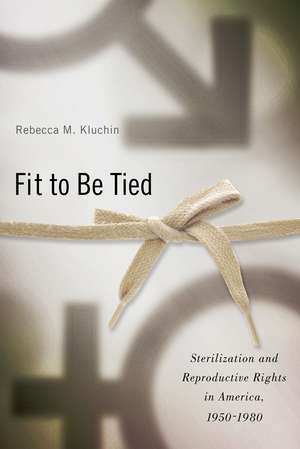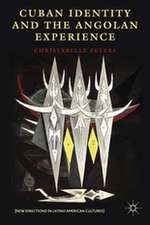Fit to Be Tied: Sterilization and Reproductive Rights in America, 1950-1980: Critical Issues in Health and Medicine
Autor Rebecca M. Kluchinen Limba Engleză Hardback – 14 mai 2009
The 1960s revolutionized American contraceptive practice. Diaphragms, jellies, and condoms with high failure rates gave way to newer choices of the Pill, IUD, and sterilization. Fit to Be Tied provides a history of sterilization and what would prove to become, at once, socially divisive and a popular form of birth control.
During the first half of the twentieth century, sterilization (tubal ligation and vasectomy) was a tool of eugenics. Individuals who endorsed crude notions of biological determinism sought to control the reproductive decisions of women they considered "unfit" by nature of race or class, and used surgery to do so. Incorporating first-person narratives, court cases, and official records, Rebecca M. Kluchin examines the evolution of forced sterilization of poor women, especially women of color, in the second half of the century and contrasts it with demands for contraceptive sterilization made by white women and men. She chronicles public acceptance during an era of reproductive and sexual freedom, and the subsequent replacement of the eugenics movement with "neo-eugenic" standards that continued to influence American medical practice, family planning, public policy, and popular sentiment.
| Toate formatele și edițiile | Preț | Express |
|---|---|---|
| Paperback (1) | 302.64 lei 6-8 săpt. | |
| Rutgers University Press – 11 mar 2011 | 302.64 lei 6-8 săpt. | |
| Hardback (1) | 1079.33 lei 6-8 săpt. | |
| Rutgers University Press – 14 mai 2009 | 1079.33 lei 6-8 săpt. |
Din seria Critical Issues in Health and Medicine
-
 Preț: 232.10 lei
Preț: 232.10 lei -
 Preț: 184.80 lei
Preț: 184.80 lei -
 Preț: 254.52 lei
Preț: 254.52 lei - 5%
 Preț: 241.78 lei
Preț: 241.78 lei - 5%
 Preț: 314.84 lei
Preț: 314.84 lei - 5%
 Preț: 292.69 lei
Preț: 292.69 lei - 5%
 Preț: 318.35 lei
Preț: 318.35 lei - 5%
 Preț: 311.37 lei
Preț: 311.37 lei - 5%
 Preț: 288.29 lei
Preț: 288.29 lei -
 Preț: 259.27 lei
Preț: 259.27 lei - 5%
 Preț: 270.90 lei
Preț: 270.90 lei -
 Preț: 315.48 lei
Preț: 315.48 lei - 5%
 Preț: 293.77 lei
Preț: 293.77 lei - 5%
 Preț: 427.88 lei
Preț: 427.88 lei - 5%
 Preț: 296.39 lei
Preț: 296.39 lei - 5%
 Preț: 298.62 lei
Preț: 298.62 lei - 5%
 Preț: 1078.40 lei
Preț: 1078.40 lei - 5%
 Preț: 298.77 lei
Preț: 298.77 lei -
 Preț: 312.21 lei
Preț: 312.21 lei -
 Preț: 286.52 lei
Preț: 286.52 lei -
 Preț: 287.67 lei
Preț: 287.67 lei - 5%
 Preț: 276.52 lei
Preț: 276.52 lei - 5%
 Preț: 305.79 lei
Preț: 305.79 lei - 5%
 Preț: 299.90 lei
Preț: 299.90 lei -
 Preț: 304.61 lei
Preț: 304.61 lei - 5%
 Preț: 290.87 lei
Preț: 290.87 lei - 5%
 Preț: 410.09 lei
Preț: 410.09 lei -
 Preț: 305.55 lei
Preț: 305.55 lei - 5%
 Preț: 1077.15 lei
Preț: 1077.15 lei - 5%
 Preț: 314.32 lei
Preț: 314.32 lei - 5%
 Preț: 301.72 lei
Preț: 301.72 lei - 5%
 Preț: 262.95 lei
Preț: 262.95 lei - 5%
 Preț: 277.67 lei
Preț: 277.67 lei - 5%
 Preț: 1072.92 lei
Preț: 1072.92 lei - 5%
 Preț: 280.06 lei
Preț: 280.06 lei
Preț: 1079.33 lei
Preț vechi: 1136.13 lei
-5% Nou
Puncte Express: 1619
Preț estimativ în valută:
206.55€ • 224.29$ • 173.51£
206.55€ • 224.29$ • 173.51£
Carte tipărită la comandă
Livrare economică 22 aprilie-06 mai
Preluare comenzi: 021 569.72.76
Specificații
ISBN-13: 9780813545271
ISBN-10: 0813545277
Pagini: 288
Ilustrații: 1
Dimensiuni: 152 x 229 x 28 mm
Greutate: 0.57 kg
Ediția:None
Editura: Rutgers University Press
Colecția Rutgers University Press
Seria Critical Issues in Health and Medicine
ISBN-10: 0813545277
Pagini: 288
Ilustrații: 1
Dimensiuni: 152 x 229 x 28 mm
Greutate: 0.57 kg
Ediția:None
Editura: Rutgers University Press
Colecția Rutgers University Press
Seria Critical Issues in Health and Medicine
Notă biografică
Rebecca M. Kluchin is an assistant professor of history at California State University, Sacramento.
Cuprins
List of Illustrations
Acknowledgments
Introduction
From Eugenics to Neo-eugenics
"Fit" Women and Reproductive Choice
Sterilizing "Unfit" Women
"Fit" Women Fight Back
Unfit" Women Fight Too
Irreconcilable Conflicts
The Endurance of Neo-Eugenics
Notes
Index
Acknowledgments
Introduction
From Eugenics to Neo-eugenics
"Fit" Women and Reproductive Choice
Sterilizing "Unfit" Women
"Fit" Women Fight Back
Unfit" Women Fight Too
Irreconcilable Conflicts
The Endurance of Neo-Eugenics
Notes
Index
Recenzii
"In Fit to Be Tied, Rebecca Kluchin impressively navigates a critical period in the history of reproductive health in America. Fit to Be Tied is very innovative in a subtle and understated way: Kluchin is one of the first historians of gender and medicine to provide a sophisticated framework for mapping the sterilization practices of the pre-World War II period into the post-Roe V. Wade culture."
"In Fit to be Tied, historian Rebecca Kluchin offers a thoroughly researched, nuanced analysis of sterilization, reproductive rights, and what she calls 'neo-eugenics.' An important and powerful book that fills a critical gap in the literature on postwar reproductive rights."
"A welcome addition to the history of sexuality, birth control, medicine, and politics in the US. The writing is compelling, and the story Kluchin tells, particularly of forced sterilizations, is harrowing. Highly recommended."
"A compelling and original account of eugenic steralization. This study adds many significant strands to the densely interwoven history of global efforts to control human populations and regulate reproduction."
"Kluchin has added an important contribution to the history of sterilization."
"Kluchin's nuanced and thoughtful study shows how sterilization was too often foisted upon poor women of color to reduce economic 'dependency' and racial 'degeneracy' while too often denied to middle-class white women who hoped to secure reliable, permanent contraception. Fit to Be Tied makes a much-needed contribution to our historical understanding of women's never ending attempts to secure reproductive control. It is a terrific and important book."
"Much more has been written on the history of birth control and abortion than on the history of sterilization in the second half of the twentieth century. Kluchin's excellent study fills this crucial gap in the scholarly literature, adding breadth and depth to our understanding of the history of reproductive rights and wrongs in America."
"Fit to Be Tied is a refreshing and vital addition to the history of reproductive politics and sexuality in America. Kluchin's analysis is both compelling and smart, demonstrating how race and class affected reproductive policy and practice in the second half of the twentieth century. Her composite portrait of sterilization is particularly interesting and important because it assesses both those who were victims of sterilization abuse and those who fought for the right to sterilization as a contraceptive. Such a study is long overdue."
"Kluchin should be congratulated for her highly readable, well-researched study of this important, but largely neglected aspect of postwar women's health history. This book makes a valuable contribution to the literature on women's studies, social policy, and the history of medicine and public health."
"Kluchin has produced a much-needed study of the social and legal status of sterilization from the 1950s through the 1970s, based on a wealth of official documents and archival materials and featuring the voices of women from across the social spectrum who were adversely affected. Her narrative is a meticulous and compelling account of the legacies of negative and positive eugenics for reproductive politics and the lives of American women differentially marked by race, ethnicity, and class."
Descriere
The 1960s revolutionized American contraceptive practice. Diaphragms, jellies, and condoms with high failure rates gave way to newer choices of the Pill, IUD, and sterilization. Fit to Be Tied provides a history of sterilization and what would prove to become, at once, socially divisive and a popular form of birth control.

















